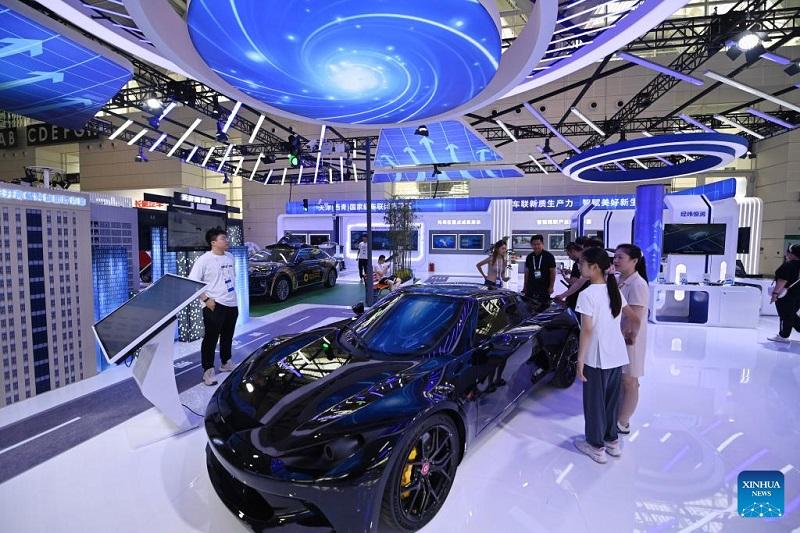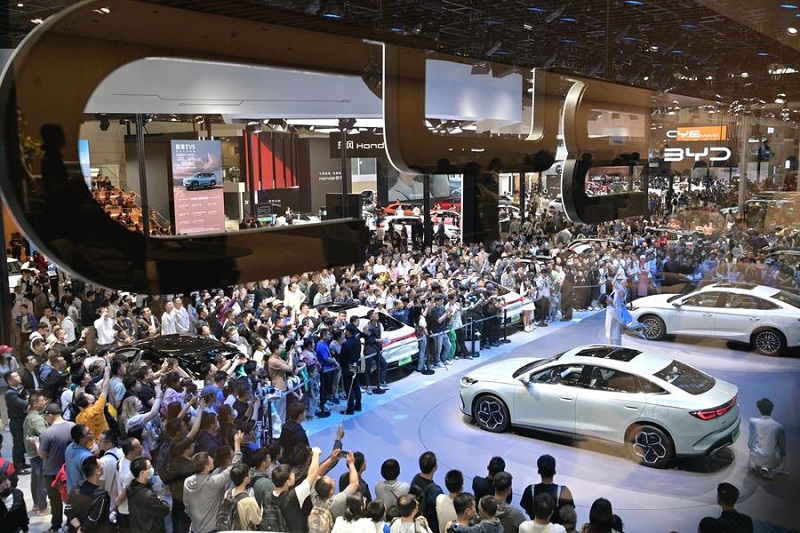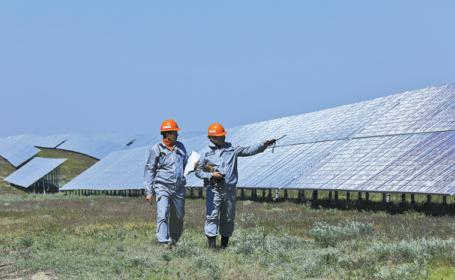By Yu Yunquan
The third plenary session of the 20th Central Committee of the Communist Party of China (CPC) in July was in the global spotlight for the reform measures it proposed to advance Chinese modernization. The plenum decided to improve the institutions and mechanisms for fostering new quality productive forces in line with local conditions and pinpointed the key areas. The reforms will give impetus to both China's development and global common prosperity. China's new quality productive forces theory and actions taken vis-à-vis them indicate the development path of Chinese socialism and are a Chinese solution for win-win cooperation and common development by sharing development opportunities.

People visit the World Intelligence Expo 2024 in north China's Tianjin, June 22, 2024. [Photo/Xinhua]
New Methodology for Global Growth
Since China began reform and opening up more than four decades ago, it has speeded up industrialization, reaching the level that took developed countries more than a century to accomplish. Chinese modernization, based on China's unique conditions and underpinned by a world view nourished by a millennia-old culture, has blazed an economic path suitable to China. The essential requirement of Chinese modernization is high-quality development, with the focus on developing new quality productive forces.
Labor productivity, a measure of economic performance, compares the output with the amount of labor used to produce that output. The concept was pioneered by Western economists represented by Adam Smith. Karl Marx elucidated the fundamental role of productive forces in advancing social progress, based on which the Marxist productivity theory was formed. As China entered a new era of development, the central leadership with President Xi Jinping at the core has made major theoretical innovations regarding productivity. As a new type of social productivity, new quality productive forces are characterized by high-tech, high efficiency and high quality. The theory is in line with the new development philosophy, inheriting the Marxist productivity theory and combining the development needs of the new era for innovative development. It's a forward-looking economic theory to guide the transformative change of global economic development.

Real-time production data is displayed at the data center of a new materials' company in Jinhua, Zhejiang Province, Aug 14, 2024. [Photo/Xinhua]
Egyptian writer Khaled Azab, who is also press attaché of Bibliotheca Alexandrina, once said China's experience not only represents a development model, but presents a new development theory aimed to build a huge global market interconnected internally and externally, going far beyond the thinking of hegemonic economy.
Committed to the principle of not interfering in other countries' internal affairs, China has provided preferential international loans without any strings attached, and established industrial parks in many developing countries, which have received widespread appreciation. Rising China, as a new type of major country, will open a new chapter of development.
That new quality productive forces theory will become a major methodology for world economic development is a conclusion supported by both its theoretical connotation and China’s development achievements in related sectors. The first half of 2024 saw 39 out of China's 41 major industries register growth year on year. The value added of China's high-tech manufacturing surged by 8.7 percent year on year, 2.7 percentage points higher than that of industrial enterprises above the designated size.
The Global Innovation Index 2023 released by the World Intellectual Property Organization placed China 12th in the innovation rankings, leading the middle-income economies. According to Chandran Nair, founder and CEO of the Global Institute for Tomorrow, a pan-Asian think tank, market demand and several other factors, like the need to protect the ecology, are driving China's development transformation. Its complete sci-tech innovation system has laid a solid foundation for new quality productive forces, which will help better meet people's expectations for a better life.
Advancing High-Standard Opening Up
The development of new quality productive forces is both vital for China's development transformation and upgrading and boosting global growth. President Xi has stressed on multiple occasions that high-standard opening up should be expanded to create a sound international environment for the development of new quality productive forces. Despite the turbulence in the international geopolitical landscape, China's determination to build a high-standard open economy remains unchanged.
China, now the world’s largest renewable energy market and biggest renewable energy equipment manufacturer, exports its wind and photovoltaic products to more than 200 countries and regions. According to the Renewable Capacity Statistics 2024 released by the International Renewable Energy Agency, over the past 10 years, the average cost per kilowatt-hour of global wind and photovoltaic power generation projects decreased by more than 60 percent and 80 percent respectively. Chinese innovation, manufacturing and engineering played a predominant role in that.

Visitors are seen at the exhibition area of Chinese NEV manufacturer BYD during the 2024 Beijing International Automotive Exhibition in Beijing, May 4, 2024. [Photo by Yin Dongxun/Xinhua]
In 2023, China's tech-intensive and green "new three" – new-energy vehicles, solar batteries, and lithium-ion batteries – saw their total export exceed RMB 1 trillion for the first time. The development of new quality productive forces has enabled more people worldwide to enjoy the convenience and benefits of clean, reliable and affordable energy products. China has given new impetus to global sustainable development with its experience in innovation. Erik Solheim, co-chair of the Europe-Asia Center and former under-secretary-general of the United Nations, said, "I am very optimistic that these new, high quality, high-tech, productive forces would be a huge step forward for humans, can make much better and lower-cost products. And we can do it in a much more environment-friendly way."
As globalization deepens and resource allocation in the world changes, China's high-standard opening up promises to create a favorable environment for the development of new quality productive forces. The country's unremitting pursuit of new breakthroughs in frontier technologies like artificial intelligence and quantum, as well as its science and technology cooperation with Belt and Road partner countries and regions demonstrate its intention to build an open environment for innovation with global competitiveness, which will nurture new quality productive forces.
Seymur Mammadov, director of the international experts' club EurAsia-Azerbaijan, once observed that scientific and technological innovation is the core of China's development, which will enhance its national strength greatly. Chinese modernization is showing a strong momentum. For China, the right way to seek development is through cooperation, openness and inclusiveness, which offers a broader vision.
Promoting International Cooperation
A close observation of the third plenum of the 20th CPC Central Committee can lead to the conclusion that the institutions and mechanisms for fostering new quality productive forces can create an enabling environment for Chinese modernization, which is expected to create new opportunities for the country's win-win cooperation with the rest of the world. While showing more confidence in high-quality development spurred by the new quality productive forces, China is poised to help create global common prosperity through deepened international cooperation and collaboration.
In today's new round of technological revolution, the major economies are promoting future-oriented industries for more development steam. The new quality productive forces were born out of technological revolution and industrial transformation. The resolution adopted at the plenum said that China will "improve the policy and governance systems for promoting the development of strategic industries such as next-generation information technology, artificial intelligence, aviation and aerospace, new energy, new materials, high-end equipment, biomedicine, and quantum technology." With the high-quality development of China's new industrial models attracting global attention, it should strengthen and improve international communication so that the productive forces are well interconnected and integrated globally.

Workers monitor solar panels at a solar power plant jointly built by China and Kazakhstan in the town of Kapchagay, in southeastern Kazakhstan's Almaty Region. [Photo/Xinhua]
Rafia Irfan, a researcher with the Institute of Strategic Studies Islamabad, noted that China has become a frontrunner in a range of technological fields, such as 5G technology, artificial intelligence, cybersecurity, and space exploration. Chinese companies, who employ talents from all over the world, are providing technical support to the growth of many developing countries.
"Made in China" products have long earned international recognition. The Democratic Practices and Modernization in China Global Survey 2023 released by the Academy of Contemporary China and World Studies, found that the respondents from 23 countries spoke highly of China’s manufacturing and technological innovations. They consider many Chinese industries, including super rice and crop hybridization, high-speed railway, 5G telecommunication, and infrastructure, to be world leaders. China advocates that the fruits of development should be enjoyed by all. From "Made in China" to "Innovated in China," China hopes to contribute more to global common development with its manufacturing prowess.
Tackling common development problems is also one of China's goals. Issues such as imbalanced ecological environment, resource shortage, and economic slowdown are common in many countries, despite their different development models. The general trend is to utilize natural resources in a scientific way, develop industries in a coordinated way, and guide quality production factors to flow toward the new quality productive force sectors. The common challenges faced by the world requires the international community to work in unison and forgo any decoupling mentality. With stronger people-to-people exchanges and strategic collaboration, the world can realize common prosperity, opening a new chapter in global modernization featuring peace, development and mutually beneficial cooperation.
Yu Yunquan is president and a research fellow of the Academy of Contemporary China and World Studies.

 中文
中文



